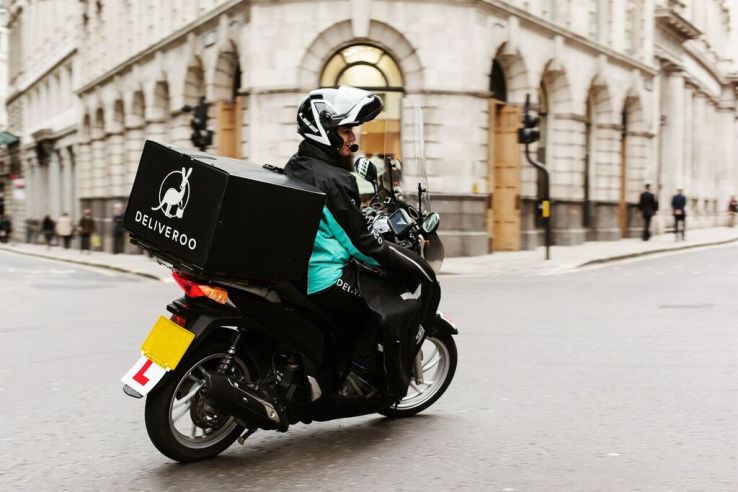 Deliveroo, a popular on-demand restaurant food delivery startup in Europe, has raised another $275 million in funding, a Series E investment that we have heard from sources values the company at around $1 billion. This latest round is led by new investor, Bridgepoint, previous investors DST Global and General Catalyst, and also had participation from existing investor Greenoaks Capital.
Deliveroo, a popular on-demand restaurant food delivery startup in Europe, has raised another $275 million in funding, a Series E investment that we have heard from sources values the company at around $1 billion. This latest round is led by new investor, Bridgepoint, previous investors DST Global and General Catalyst, and also had participation from existing investor Greenoaks Capital.Deliveroo says the investment will go into growing its service in both new and existing markets, where it’s now live in 84 cities. It’s also going to keep investing in its new initiatives. These include a new B2B remote kitchen service, RooBox, which gives restaurants access to delivery-only kitchens in key locations. Other new services have included an expansion into alcohol delivery.
Deliveroo, which is not confirming its valuation, has now raised $475 million to date.
This latest funding comes at a time when the startup is facing a lot of heat from others who are also targeting the higher, foodie end of the prepared food market (typical Deliveroo restaurants include artisanal pizza and burger joints, trendy Middle Eastern delis, and hipster donut bakeries).
Rivals include Uber, which has stormed into Europe with UberEATS, as well as others like Delivery Hero and Just Eat, and now, it seems, Amazon too (whose own food delivery project in Europe is currently codenamed “Hot Wheels”).
The intense competition in the market has led to a distinctly sink-or-swim climate, with other hopefuls like Take Eat Easy closing down last week after failing to raise money.
Sky News reported news of Deliveroo’s round earlier today, and we have confirmed the details with Deliveroo directly.
“After seeing strong growth in the markets we launched in November, our new focus is to drive further innovation in food delivery,” founder and CEO Will Shu said in a statement. “In particular, I’m excited about exploring completely new ways to solve the hardest problems restaurants face when offering delivery. RooBox is the first illustration of this approach, and innovations like these are at the heart of our mission. We’re proud and honoured to have the support of Bridgepoint, DST Global and General Catalyst in this endeavour.”
We had been hearing about Deliveroo’s attempts to raise this round for months now, and our information came with several other interesting details.
For one, we were told that this round has been taking some time to close — nine months, by one person’s estimate — as the size and terms have fluctuated.
Also, multiple sources allege the company had hired Morgan Stanley either to help arrange financing for this deal, or potentially to find a buyer for the company. Among those that were approached as potential buyers or partners: Uber, Delivery Hero, Amazon, Just Eat and Takeaway.com.
To be clear, Deliveroo denies conversations about partnerships or acquisitions and says that the round was oversubscribed.
Deliveroo, meanwhile, has been growing. It says that since its last round of funding ($100 million in November 2015), it has grown 400 percent and “reached profitability in a number of its established markets,” which would include London. It has also added 29 new cities and 9,000 new restaurant partners to its footprint in the last eight months.
And if we’re in a sink-or-swim climate at the moment, for now competitors are just happy to see Deliveroo seal the deal, since rising tides will help lift all (remaining) boats. “It’s good news that they managed to finally close,” another food delivery founder told me. “I think everyone was nervous it would be one of Europe’s largest failures… It would have affected the whole industry.”
Notably, Uber opted to partner up and sell off its operation in China to arch rival Didi Chuxing after it proved too costly to compete against it. Whether that might be a precedent for other geographies and categories beyond basic transport remains to be seen.
For now, there has been a lot of competition between Deliveroo and UberEATS in markets like London, not just to secure restaurants for delivery and to find loyal customers, but also to pick up drivers to complete orders.
Anecdotally, drivers we’ve interviewed who have made the leap to Uber from Deliveroo tell us the pay is better — meaning Uber’s competing by sacrificing margin to gain market share.
Confusingly (or serendipitously?), the green-lettered black delivery boxes for UberEATS and Deliveroo look nearly identical.
Deliveroo says that since its Series D, it has added 6,500 new riders to its network.
Updated with more response from Deliveroo.
0 Response to "Food startup Deliveroo raises $275M as Uber eats into its European market"
Post a Comment